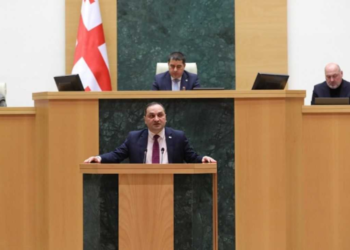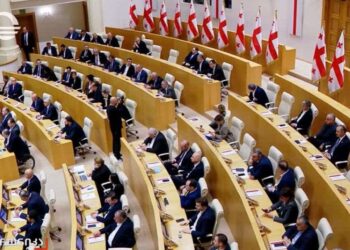The European Commission has sent formal letters to Georgia’s ruling Georgian Dream government, warning that visa-free travel to the EU could be suspended unless the country complies with key democratic and human rights recommendations.
In a letter addressed to Foreign Minister Maka Bochorishvili, the Commission outlined eight major recommendations, including repealing the controversial “foreign influence” law, protecting LGBTQ+ rights, strengthening anti-corruption mechanisms, and aligning Georgia’s visa policy with EU standards.
The letter, signed by Beate Gminder, Deputy Director-General of the EU’s Migration and Home Affairs Directorate, followed a July 15 Foreign Affairs Council meeting in Brussels where concerns over Georgia’s democratic backsliding were prominently raised.
“The Commission will assess compliance with these recommendations in the next visa suspension report,” the letter states, warning that non-compliance could trigger the activation of the visa suspension mechanism under Article 8 of the revised Visa Regulation.
Georgia has enjoyed visa-free travel to the EU since 2017, a milestone described in the letter as a “tangible benefit” for Georgian citizens. However, the most recent visa evaluation by the EU in December 2023 cited serious breaches of fundamental rights, including discrimination and violations of freedoms of expression and assembly.
The Commission specifically calls on the Georgian government to:
-
Repeal the “foreign influence” law and the “family values” legislative package,
-
Amend the national human rights strategy to protect LGBTIQ rights,
-
Strengthen the independence and political neutrality of the Anti-Corruption Bureau,
-
Set up Asset Recovery and Management Offices,
-
Align its visa policy with the EU’s list of visa-required countries,
-
Address the high number of unfounded asylum claims in the EU.
A similar letter was sent to Vakhtang Makharoblishvili, Georgia’s ambassador to the EU, requesting a status update on reforms by end of August.
EU foreign policy chief Kaja Kallas, speaking after the Council meeting, warned:
“So far, we have tried not to hurt Georgian citizens… but the EU’s credibility is at stake.”
The warnings come after Georgian Dream halted the country’s EU accession process in late 2024 and passed repressive legislation criticized by both EU officials and 18 European foreign ministers, who labeled the government’s direction as “anti-European” and “authoritarian.”
Georgia’s government has pushed back, accusing Brussels of “blackmail.” However, 42 Georgian civil society organizations (CSOs) responded with a joint statement saying any suspension of visa-free travel would be the direct result of the government’s actions.
Political analyst Vano Chkhikvadze described the letter as a formal step in the EU’s suspension procedure:
“If there’s no course correction, the year-end EU report may recommend suspending visa-free travel—either entirely or partially.”
In January 2025, the EU already suspended visa-free access for Georgian diplomatic and service passport holders.
The letter ends with a strong reminder of the EU’s commitment to a “values-based partnership” with Georgia—but underscores that this relationship depends on Tbilisi’s respect for European democratic norms.














